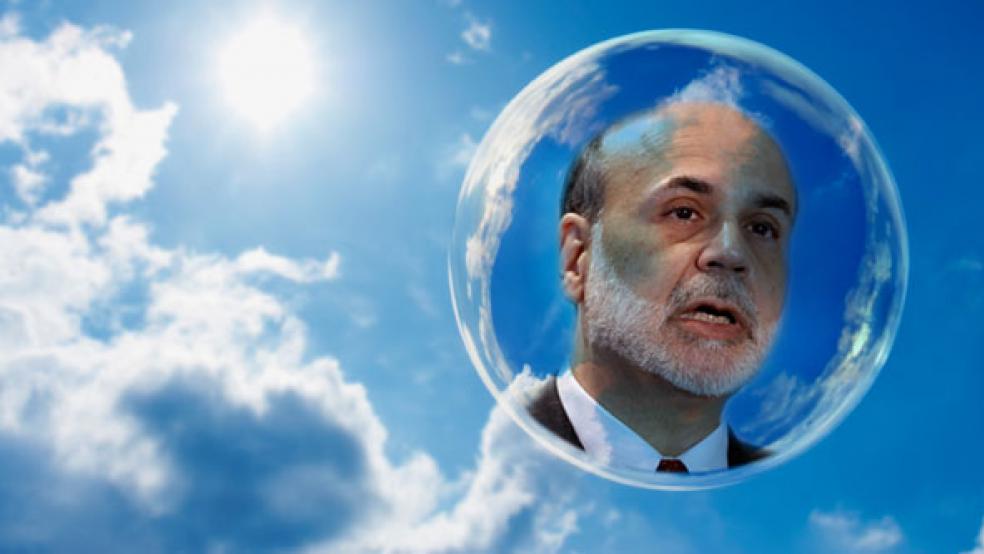The Federal Reserve’s quantitative easing program is becoming disruptive – so much so that no lesser authority than big government apologist Paul Krugman has thought it necessary to dismiss its impact.

In a recent column, Krugman ascribed the current collapse of emerging market currencies to – no kidding – financial deregulation! Yup, it’s not the trillions of dollars being spun out of Ben Bernanke’s money machine that has crushed Brazil’s real or India’s rupee, it’s that U.S. banks can engage in securities trading.
Krugman hovers briefly over the Fed’s “loose-money policies” but then concludes the central bank is “only doing its job,” and thus is not responsible for the dislocations now being felt across Asia and Brazil.
That will come as news to the international financial community. Finance types from emerging countries pleaded with the Fed at the recent Jackson Hole confab to consider the havoc that may be wrought – indeed, already has been wrought – on their markets from a prospective wind-down of quantitative easing. As reported by Bloomberg, stocks in those countries have lost over one trillion dollars in value since May, when Bernanke started musing about slowing our central bank bond purchases.
Brazil, Indonesia, India and Peru have had to intervene to prop up their devastated currencies; the Turkish lira and Indian rupee hit record lows in June. Brazil’s airline recently asked for help from the government, so dire has been the impact of the collapsing real. IMF head Christine Lagarde warned of more damaging market volatility, and asked for clear signaling of the Fed’s intentions.
Notwithstanding the (knowledgeable) chorus lamenting the impact of QE, Krugman pins the tail on the donkey of financial deregulation. More specifically, he says it’s all the fault of investors chasing profits. Because the Fed’s QE programs crushed returns in the U.S., pension fund managers and others scoured the globe trying to meet their obligations to investors, and for a time found value in emerging markets.
Then came taper talk, with Bernanke clumsily pointing out the obvious--that the Fed could not continue to buy $85 billion per month of bonds indefinitely. Rates started to rise and investors began streaming back to the U.S. So far this year, the MSCI index of emerging markets is off roughly 12 percent, while developed countries’ markets are up some 13 percent. That’s how it works.
Krugman is unhappy with the notion that anyone might blame Fed policy for the shifting of gears, and instead points the finger at the list of financial “bubbles” perpetrated by the “international movement of capital.” More specifically, he blames “banks gone wild” for the dot.com bubble, the housing bubble, the commercial real estate bubble of the 1980s and pretty much every past disaster other than the sinking of the Titanic. Before deregulation, Krugman claims, there were no bubbles.
He has a short memory. Bubbles have existed throughout history, not because of financial deregulation but because of a much more prosaic cause – human nature. The Dutch tulip craze of the 1600s looks a lot like the 1873 railroad bond bubble, the 1920s stock market euphoria, the 1980s Nikkei debacle or the 1990s dot.com hype. The demolition derbies that follow are all of a piece.
The unifying principle is investor confidence that prices will only go up. Prices reach unrealistic levels – sometimes fueled by well intentioned but ultimately disastrous government policies, such as those that raised deep gas prices in the 1980s, or those that in recent years encouraged lending to credit-challenged home buyers. Those eager to capitalize on the “sure thing” du jour borrow to excess, and inevitably get caught with their pants – or credit lines – down. Panicky selling, and ruin, follows.
Krugman may never have heard of the nifty fifty- the favorite stocks of the 1960s that got slammed when investors discovered that paying 100 times earnings for Levitz Furniture and Avon was not, actually, good value. The high-fliers quickly lost some 90 percent of their market value in the early 1970s.
It’s astonishing to find an economist today who disapproves of international capital flows. Most would view free flows of money essential to trade globalization and to the improved well being of millions of people around the world. In the past, governments would shut down capital outflows to protect their currencies, and inevitably create worse problems going forward – usually a crippling recession as trade ground to a halt.
Finance authorities around the world would do well to disregard Krugman’s implied encouragement of capital restrictions, and so far they have. At the same time, our Federal Reserve should tread carefully. We have had four straight years of disappointing growth-- each year economists have scaled back their expectations of a second-half acceleration, and so it is today. During most of that time, the engine of global expansion has been the emerging markets, and especially the rise of Asia. Jeopardizing that potential – crucial to our economy -- is not a wise move.
Our loose money policies are adding some froth to our own housing market and buoying consumer purchases of big ticket items like cars. Similar moves in Japan, England and elsewhere have also been helpful. But, ramping up money growth indefinitely carries the risk of inflation, and the Fed is right to contemplate winding down the program. The taper plan should be extended, and laid out clearly at the next Fed meeting, so that investors can react and markets settle.
Krugman dismisses the risk of inflation because we have not seen it yet. That’s because our economy is underperforming and unemployment is high. Producers and workers alike are unable to raise prices. That can change, in a heartbeat. In 1965, inflation was 1.59 percent, below today’s level; one year later it had nearly doubled. In 1972, the cost of living was rising at a 3.3 percent rate; by 1974 that had jumped to 11 percent. The oil embargo and subsequent jump in oil prices sparked the latter increase; but, as is usually the case, we didn’t see it coming.




